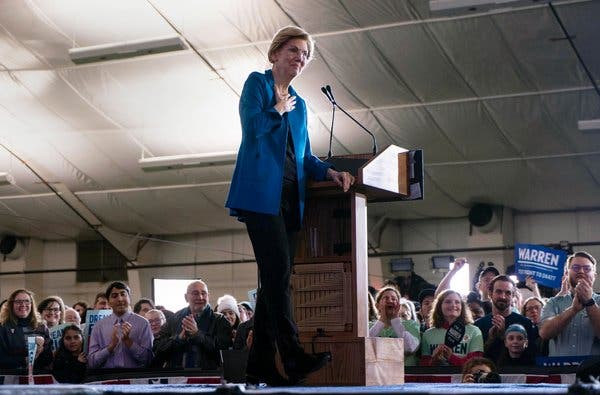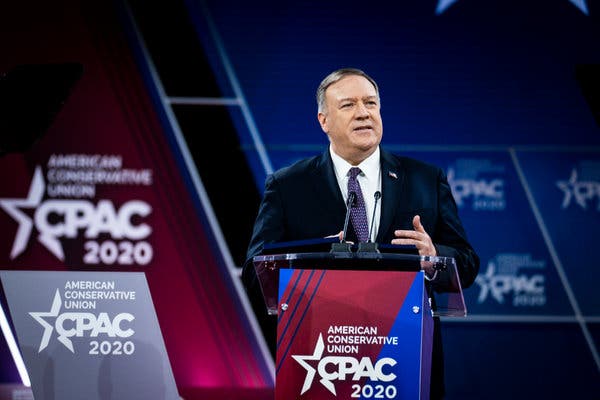Advertisement
Poll Watch
It has been over a month since any relevant state-level poll was conducted. So if candidates like Cory Booker or Tulsi Gabbard have made gains in early-voting states, there’s no polling to show it.

Welcome to Poll Watch, our weekly look at polling data and survey research on the candidates, voters and issues that will shape the 2020 election.
It might be hard to believe, considering the constant chatter about who’s up and who’s down in the polls, but there’s a lot we don’t know about where things stand in the states that vote first in the 2020 Democratic presidential contest.
That lack of clarity is worth keeping in mind as you watch Thursday night’s debate.
To make it into the debate, candidates needed to receive at least 4 percent support in four Democratic National Committee-approved polls (of either the nation or an early-voting state).
But no qualifying state poll has been taken since before the last debate, on Nov. 20. That means the lineup on Thursday may not reflect the latest state of the race.
If any of the candidates who were excluded from Thursday’s stage — like Senator Cory Booker of New Jersey or Representative Tulsi Gabbard of Hawaii — have made a recent surge in Iowa, New Hampshire, Nevada or South Carolina, there haven’t been any qualifying polls to show it.
“Indisputably, the polls lag,” said Douglas Burns, an owner of The Carroll Times Herald in northwestern Iowa. “That’s always been the case, and it’s certainly the case where in social-media cycles things can turn quickly.”
Pete Buttigieg, the mayor of South Bend, Ind., is now widely seen as a leading candidate, particularly in Iowa, and he is expected to face a new level of criticism from his peers onstage Thursday. But much of his reputation rests on the nine-point lead he amassed in one Des Moines Register/CNN poll last month — the only debate-qualifying survey to show him with an outright advantage.
(He was shown in a statistical tie with his fellow front-runners in two other Iowa polls from early November. No other D.N.C.-approved Iowa poll has come out since the Register/CNN survey, which was conducted from Nov. 8-13.)
The ground in early-voting states like Iowa and New Hampshire is highly fluid, and fortunes can change on what seems like a weekly basis. Reports of momentum from the field often differ from what polls indicated a few weeks ago.
“There can be radical shifts, particularly in Iowa, over the last few weeks” of a campaign, said Patrick Murray, the director of the Monmouth University poll.
That’s particularly true this year, when there is an uncommonly large group of Democratic candidates — four of whom are bunched together at the top of the field. In most national polling averages, Mr. Buttigieg is at the bottom of that tier, behind former Vice President Joseph R. Biden Jr. and Senators Bernie Sanders and Elizabeth Warren.
All nine of the D.N.C.-sanctioned polls that came out since the last debate were conducted nationally, not at the state level. In such a crowded primary, with months to go before most nominating contests, the national electorate’s preferences are very much subject to change.
Besides, Mr. Murray said, most voters “are going to be facing a very different set of candidates than the ones that are on the ballot right now, because the field will get winnowed down significantly after the February contests.”
“So the polls simply give you a sense of who Democratic identifiers think might be a good nominee, but are in no way predictive of how this process will roll out,” he added.
Indeed, in national as well as state surveys, most Democratic voters still say they are open to choosing a different primary candidate. In a CNN poll released on Thursday morning, 61 percent of Democratic voters nationwide said they hadn’t yet settled firmly on a candidate. That’s compared to 58 percent who said so in CNN’s November poll.
The seven candidates slated to appear onstage Thursday represent the smallest lineup at any of the six Democratic debates so far. Andrew Yang and Tom Steyer — both businessmen who have been polling in the low-to-mid-single digits — barely qualified. Other candidates with similar national polling, like Mr. Booker, Ms. Gabbard and former Mayor Michael R. Bloomberg of New York (who joined the race last month) didn’t make the cut.
After Mr. Booker failed to qualify for the upcoming debate, he led a group of nine candidates in writing a letter to the D.N.C. arguing that the debate-qualification criteria — which include a fund-raising benchmark as well as a polling threshold — should be relaxed.
“Candidates who have proven both their viability and their commitment to the Democratic Party are being prematurely cut out of the nominating contest before many voters have even tuned in — much less made their decision about whom to support,” the letter said.
But Tom Perez, the D.N.C. chairman, defended the criteria, which have become increasingly exclusive as the debate season has gone on. “As we get closer and closer, you need to demonstrate that you are making progress,” Mr. Perez said in an interview with The New York Times last week.



